- Home
- Robert Graves
The Anger of Achilles Page 8
The Anger of Achilles Read online
Page 8
At Helen’s approach, these grey-beards muttered earnestly among themselves. ‘How entrancing she is! Like an immortal goddess! Yes, marvellously like one! I cannot blame the Trojans and Greeks for battling over her so bitterly! True, but beautiful though she be, I do wish the Greeks would take her back! I agree, her presence endangers our lives and our children’s too!’
Priam hailed Helen; ‘Sit next to me, dear child, if you want a clear view of your former husband and your relatives and friends! I am not blaming you for this wretched war; the gods alone are responsible… Please tell me: who is the sturdy, fine-looking Greek nobleman yonder? Granted he has comrades a head taller than himself; yet I never saw so regal a bearing—he must be a king?’
‘Accept my devoted homage,’ Helen cried. ‘But, dear Father, I ought to have died before eloping with Prince Paris—imagine, leaving my home, my family, my unmarried daughter, and so many women friends of my own age! But leave them I did, and now I weep for remorse…’
When Priam repeated his question, she answered: ‘Yes, that sturdy nobleman used to be my brother-in-law. He is the High King Agamemnon himself: a powerful ruler and a brave soldier. Oh, I am a shameless bitch, if ever there was one!’
‘A fortunate king,’ old Priam exclaimed, gazing at Agamemnon in even greater admiration, ‘and evidently well loved by the gods! What a huge number of vassals he can command! I remember many years ago when I had taken some Trojans to reinforce the army of my allies Otreus and Prince Mygdon in Phrygia, a country of vines and horses—their enemies were Amazons, each of them a match for any man at fighting—I came upon the Phrygians encamped by the River Sangarius. A large army indeed, yet small compared with Agamemnon’s.’
Then Priam caught sight of Odysseus, and asked again: ‘Come, dear child; tell me the name of that nobleman who has just removed his armour! He may be a head shorter than the High King, but his chest and shoulders are even broader. He reminds me of a stocky, thick-fleeced ram ranging among a flock of ewes.’
She answered: ‘That is Odysseus, son of Laertes, from the rugged island of Ithaca; he constantly invents cunning new stratagems.’
Antenor agreed: ‘Yes, my lady, Odysseus, nicknamed “the Crafty”! He and King Menelaus once came here as ambassadors to demand your surrender. I entertained them both in my palace, and well I recall their appearance and style of speaking. Menelaus towered above our folk while we stood, though when we sat, Odysseus had the more regal appearance. At a council convened to receive them, Menelaus, who was the younger of the two, pleaded his case briefly, clearly, and to the point. As for Odysseus, when he was handed the wand, he rose and held it stiffly before him, without the least gesticulation. We thought: “A fool, a mere rustic,” until his deep voice boomed out. Then his words struck a chill in our hearts, like the falling snowflakes of winter, and justified his rigid stance.’
Priam pointed to a third man, and said: ‘Helen, tell me the name of yonder giant! He is easily the tallest and strongest in Agamemnon’s army.’
She answered: ‘You must mean Ajax, son of Telamon, his leading champion. And over there, at the head of the Cretan contingent, stands King Idomeneus. In the old days, he often visited Sparta; Menelaus and I would feast him. I recognize all the other commanders. Only two faces are missing where can my twin-brothers be: Castor the Horse-Breaker and Polydeuces the Boxer? Either they would not enlist in Menelaus’ Laconian forces, or else they have absented themselves from today’s battle because of the many unkind things said about me.’
The truth was that both her brothers were long since dead and buried in their native country, after they had ambushed a pair of rival twins from Messene: Idas and Lynceus. None of the four survived that fight.
Trojan heralds had meanwhile fetched the lambs, and a goatskin full of wine for the oath-taking ceremony. One of them, Idaeus by name, who carried the necessary golden mixing-bowl and cups, approached Priam. ‘Son of Laomedon,’ he cried, ‘the leaders of the High King’s mail-clad Greeks and of your Trojan chariot-fighters join in requesting your presence on the plain for the purpose of ratifying an armistice. It is agreed to settle our differences by a single combat between Prince Paris and King Menelaus the Warrior, the survivor being entitled to keep this lady and her fortune. Afterwards, if you consent, we Trojans will outline a treaty of friendship with the Greeks; they can then sail home to their land of thoroughbred horses and lovely women, leaving us in peace.’
Priam shuddered at the news, but gave orders for his team to be harnessed; and soon he mounted the royal chariot, holding the reins while Antenor stood by him. They drove through the Scaean Gate, and across the Scamandrian Plain until they reached the Bateia. There they dismounted and walked along the Trojan ranks. Agamemnon, sitting near Odysseus, rose to greet them; and presently the sacrosanct heralds, having brought everything needed for a solemn oath-taking, emptied the contents of the goatskin into the bowl, mixed the wine with water, and poured more water over the hands of princes entitled to assist in the rite. Then, drawing the dagger that hung beside his heavy sword, Agamemnon shore a lock from the poll of each lamb. After the heralds had distributed strands of wool among the leaders of both armies, he raised his arms and prayed aloud:
‘ZEUS, most glorious and great
On Mount Ida holding state;
SUN, observant as you go
Of all oaths taken here below;
Fertile EARTH, whose sons we are;
RIVERS, rolling from afar;
FURIES, in your dismal den,
That plague the spirits of false men:
Bear witness, all of you, to this
Sworn, solemn pact and armistice!’
Agamemnon continued: ‘The terms agreed upon are as follows. If Prince Paris kills my brother, King Menelaus the Warrior, he is at liberty to keep Queen Helen with her entire fortune; and we will sail peacefully home to Greece. If, contrariwise, Menelaus kills Paris, you Trojans must restore Queen Helen with her entire fortune, also paying me an indemnity so large that it will become proverbial. Item, should King Priam and his sons, however, fail to pay me the aforesaid indemnity, I shall regard this armistice as no longer in force, and fight the war to a finish.’
Having cut the lambs’ throats with a ruthless flourish, Agamemnon laid their carcases, gasping and twitching, on the ground. Wine was ladled from the mixing-bowl into cups, and the princes poured simultaneous libations, inviting the gods to witness their pact. Many Trojans and Greeks used the same form of prayer:
‘ZEUS, great ruler of the sky,
And your fellow-gods on high,
Attend: we Greeks and Trojans both
Bind ourselves by one strong oath:
May all evil men who dare
To forswear the pact they swear,
Suffer death at your divine
Rebuke! As this red flow of wine
Spilling, falls, and falling, stains,
So may they also spill their brains,
And may their wives not mourn them dead
But frolic each in a strange bed!’
Zeus disregarded these supplications too.
Priam now announced: ‘I am returning to Troy before my dear son fights King Menelaus the Warrior. Since Zeus and the other Olympians alone know which of the pair is doomed, the anxiety of watching this contest will be more than I can bear.’ He took up the dead lambs, placed them in his chariot, and drove off with Antenor.
Hector and Odysseus, having marked out the field of battle, dropped two pebbles into a bronze helmet—one for Paris, one for Menelaus, as lots to decide who should throw the first spear. Prayers were thereupon offered by the Trojan and Greek spectators, many of whom used the same forms:
‘ZEUS, most glorious and great
On Mount Ida holding state,
Judge these men well:
And send whichever caused this war—
Our burden nine long years and more—
Hot-foot to Hell!’
And:
‘Great ZEUS;
may this
Sworn armistice
Not end amiss!’
Hector, keeping his head averted to ensure fair play, shook the helmet; Paris’ pebble leaped out at once. The princes retired and sat down where they had left their chariots and arms. Paris prepared for combat, putting on a pair of greaves fastened at the ankles with silver clasps, and borrowing his brother Lycaon’s corslet. Across this stretched a baldric from which hung the scabbard of his silver-studded bronze sword; and a menacing horsehair crest embellished his helmet. Then he chose a large, strong shield, and a tough spear of convenient weight. When Menelaus had also armed himself, a hush fell on both armies, as the two opponents strode forward simultaneously. They approached quite close to each other and stood brandishing their spears.
Paris made the first cast. His spear struck Menelaus’ circular shield, but the bronze point turned on impact and failed to penetrate the thick layers of bull’s hide. Now came Menelaus’ turn; taking accurate aim, he prayed to Father Zeus:
‘Great ZEUS, grant me revenge at last!
Guide well the heavy spear I cast
At Paris, cause of all our woe—
To loathsome HADES let him go!
And let his punishment deter
Each self-confessed adulterer
From what you gods detest the most:
The crime of cuckolding his host!’
His spear tore its way through Paris’ shield; but Paris jerked sideways, and though his breast-plate and tunic were pierced, he took no hurt. Menelaus pressed the advantage by rushing at him, sword in hand, and dealt such a blow on his helmet ridge that the sword flew into three or four pieces. Gazing reproachfully up to Heaven, he cried:
‘Great ZEUS, most callous god of all,
You hear but will not grant my plea
For this proud libertine’s downfall:
Look how your spite has injured me!
‘Ah, ZEUS, have I not cause for shame?
My broadsword shatters in my hand,
My only spear has missed its aim;
Baffled and weaponless I stand!’
So saying, Menelaus sprang forward, took a firm grasp of Paris’ crest, and swung him bodily around with it. Half-strangled by the embroidered chin-strap, Paris could not help being dragged off towards the Greek front-line. The combat would have ended immediately in Menelaus’ triumph and deathless glory, had not Zeus’ watchful daughter, Laughter-Loving Aphrodite, reached out an invisible hand and broken the chin-strap, so that Menelaus found himself holding the empty helmet. He tossed this to his comrades, who kept it for him; then picked up Paris’ spear and turned again to dispatch him.
But where was Paris? He had completely disappeared, with Aphrodite’s timely help.
***
Aphrodite disguised herself as Helen’s favourite slave, an old wool-carder from Sparta. Finding Helen still on the watch-tower by the Scaean Gate, she passed through a crowd of Trojan women, and caught at her perfumed robe. ‘My lady,’ said Aphrodite, ‘Paris has sent me to fetch you! He is home again, stretched on his inlaid bed upstairs, wearing a fine nightshirt, and as handsome as ever he was. Nobody would dream that he had been fighting Menelaus; he looks as though he were off to a dance, or perhaps just returned from one, and enjoying a short rest.’
Helen’s heart leaped at the news, but when behind the disguise she made out Aphrodite’s lovely neck, white breasts, and sparkling eyes, she exclaimed: ‘You demon, how can you deceive me so? Now that Menelaus has killed Paris and I must go back to Sparta, are you luring me to another great city of Phrygia or Maeonia? I believe you have taken a fancy to some new prince——I believe you want to reward him with my accursed love, as you rewarded Paris! Away now, and court your latest favourite! Avoid Olympus, forget your godhead, listen sympathetically to his troubles, and protect him until he offers you marriage—or enslavement! Myself, I refuse to decorate your chosen lover’s couch; all these Trojan women would abominate me if they heard of it, and I have difficulties enough already.’
Aphrodite answered: ‘Dare provoke me, hussy, and I shall desert you! My hate is as extravagant as my love. I am capable of still further embittering Graeco-Trojan relations, and arranging a dreadful death for you, whom I have loved so much.’
Helen, in alarm, beckoned to her ladies-in-waiting, and stole from the tower; none of the other women noticed their departure. Aphrodite led the way to Paris’ splendid house, where the ladies-in-waiting resumed their work, but Helen hurried upstairs to the spacious bed-chamber. Aphrodite fetched a stool with her own hands and took it over to where Paris lay. Helen sat down, scowled, and began reproaching him.
‘So here you are! What a disgraceful sight! I almost wish my former husband had put you out of your misery. You used to boast yourself his match as a fighter! Very well, get up from that bed—go back, and challenge him once more…’
‘Stop being cruel,’ he answered. ‘This afternoon Athene helped Menelaus to win his round; some other day I may win mine. You and I also have a goddess to assist us.’
‘No, no,’ Helen sobbed, ‘I did not mean what I said! Please keep clear of Menelaus; I could not bear to watch a second single combat. He might kill you.’
‘Darling,’ Paris coaxed her, ‘come here and make love! I never felt so strong a passion for you since I carried you off from Sparta and we spent our first night together on the little island of Cranae. This is going to be no less wonderful for us both.’
He drew Helen towards him. She climbed into bed, and they lay clasped in each other’s arms.
***
Meanwhile, Menelaus went prowling through the enemy ranks like a wild beast seeking the prey that has escaped it. But Paris was not to be found, either among the Trojans or among their allies; and, indeed, not a man in the whole of Hector’s army would have been charitable enough to conceal him from Menelaus. They all hated Paris, worse than death, for having disgraced them.
At last Agamemnon cried: ‘Pray lend me your attention, Trojans, Dardanians, and you other allies! I declare my brother Menelaus victor of the agreed combat, and require you to surrender Queen Helen, with her entire fortune; and further to pay me, as stipulated, an indemnity so large that it will become proverbial.’
The Greeks yelled applause.
Book Four:
Agamemnon Inspects His Army
The Olympians sat in Zeus’ presence, discussing mortal affairs and gazing down on the city of Troy, while the pretty Goddess Hebe tripped from throne to throne across Heaven’s golden floor and replenished golden goblets with nectar. They drank one another’s healths.
Zeus, to tease Hera, said slyly: ‘Fortunate Menelaus has a couple of goddesses at his service—Hera, and my friend Alalcomenes’ young pupil Athene. Look at them seated close together, watching their champion! Paris, for his part, can count on Laughter-Loving Aphrodite’s assistance; just now she rescued him from what seemed certain death. So we should surely decide now which alternative to favour: whether more war, or a reconciliation of the two armies? Everyone, I trust, agrees that the city of Troy must not cease to exist, but that Menelaus should get his wife back.’
Hera and Athene, busy plotting the Trojans’ overthrow, muttered their dissent. Athene managed to curb her rage at Zeus’ mention of the mortal tutelage under which she had once been placed; but Hera, having less self-control, burst out: ‘Revered husband, what are you saying? After I have driven my horses nearly off their feet, and sweated almost as much myself, mustering that immense Greek army and launching it against Priam and his sons, how can you bear to ruin my work? Do as you please, of course; the rest of us are by no means unanimously in favour of your proposal.’
‘Heartless, am I?’ Zeus echoed gruffly. ‘Look at yourself! What great injury have Priam and his sons done you that justifies this furious resolve to sack his splendid fortress? Perhaps the only way of glutting your horrid appetite would be for you to burst through the gates and eat the whole royal family raw—and every Trojan commoner into the barg
ain? Well, I should let that pass, so long as no fresh trouble arises between us. But here is a serious warning: if some day I feel inclined to destroy a city of which you happen to be fond, I will tolerate no opposition. You must acquiesce, with a loyal pretence of cheerfulness; since of all cities under the sun and stars, holy Troy is the one I most value. Priam and his fighting people have never once failed to honour their altars with the libations and burnt offerings due to my majesty.’
‘It is a bargain!’ answered Hera. ‘If you should feel a sudden dislike for any of the three cities which I most value—Argos, Sparta, and Mycenae of the Broad Streets—I shall certainly not raise a finger in their defence: you may destroy them all. Indeed, it would be foolish to oppose you or bear a grudge afterwards, because your power is far greater than mine. Still, projects at which I have worked so hard should not be baulked. I am as divinely born as you are, and claim the Queendom of Heaven on two counts: being both a daughter of Father Cronus, whose kingdom you usurped, and your wife. Very well then: each of us can humour the other, in a hope that all Immortals will henceforth adopt our common policy. So send Athene down to the Scamandrian Plain where the armies are raising such an outcry over Menelaus’ victory; she might well persuade some stupid Trojan to break the armistice.’
Zeus agreed. He called Athene and said briskly: ‘Hurry off and do as Hera suggests!’
Pallas Athene darted from Olympus, eager to carry out this plan. Disguised as a meteor of the kind that scatters sparks when it falls, and is greeted with awe by sailors or an army, she plunged down on the no-man’s-land between Greeks and Trojans. A cry of astonishment went up, and it was remarked on both sides: ‘That meteor must have some deep significance! Either it foreshadows a return of hard fighting, or else it is Zeus’ promise of peace.’

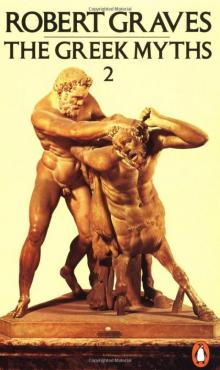 The Greek Myths, Volume2
The Greek Myths, Volume2 The Anger of Achilles: Homer's Iliad
The Anger of Achilles: Homer's Iliad Count Belisarius
Count Belisarius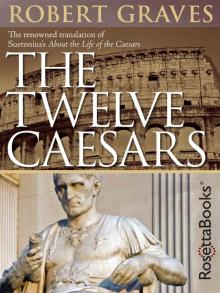 The Twelve Caesars
The Twelve Caesars Complete Poems 3 (Robert Graves Programme)
Complete Poems 3 (Robert Graves Programme) Homer's Daughter
Homer's Daughter The White Goddess
The White Goddess Goodbye to All That
Goodbye to All That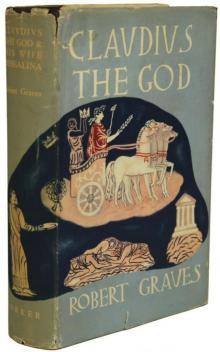 Claudius the God and His Wife Messalina
Claudius the God and His Wife Messalina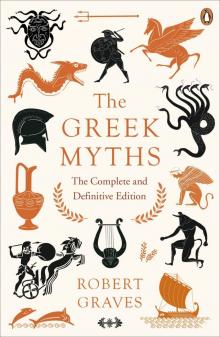 The Greek Myths
The Greek Myths I, Claudius
I, Claudius The Islands of Unwisdom
The Islands of Unwisdom Complete Short Stories
Complete Short Stories The Golden Fleece
The Golden Fleece They Hanged My Saintly Billy
They Hanged My Saintly Billy King Jesus
King Jesus Sergeant Lamb's America
Sergeant Lamb's America Hebrew Myths: The Book of Genesis
Hebrew Myths: The Book of Genesis Seven Days in New Crete
Seven Days in New Crete Proceed, Sergeant Lamb
Proceed, Sergeant Lamb Claudius the God
Claudius the God Wife to Mr. Milton
Wife to Mr. Milton The Complete Poems
The Complete Poems The Anger of Achilles
The Anger of Achilles Claudius the God c-2
Claudius the God c-2 Hebrew Myths
Hebrew Myths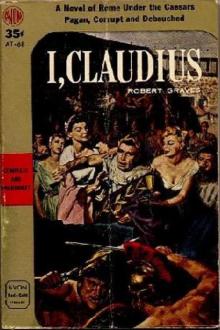 I, Claudius c-1
I, Claudius c-1 The Greek Myths, Volume 1
The Greek Myths, Volume 1